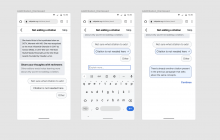The initial reference check user experience we've been defining in T325711 includes an option for people to forego adding a reference to the content they are attempting to add:
This task involves the work with finalizing the responses people will be presented within the moment immediately after they decline to add a reference.
Stories
- As a newcomer/Junior Contributor who has chosen to forego adding a reference to the content they are planning to publish to Wikipedia, I would like to know what information/content I can offer to the experience volunteers who are likely to review/patrol this soon-to-be published edit, so that I can increase the likelihood that the contribution I consider to be useful and worthwhile remains on the wiki.
- As an experienced volunteer who is reviewing an edit in which someone has a) added new content and b) decided NOT to verify that new content with a reference, I would like to know why this person made this decision so that I can decide what – if any – action (e.g. revert the edit, post a message on the person who made the edit's talk page, etc.) to take in response
Requirements
In-edit decline responses
- People who decide not to add a reference when Edit Check prompts them to consider doing so ought to see a dialog that asks them to articulate "why" they've made this decision.
- This dialog ought to contain a question that reads: Why are you not adding a citation?
- This dialog ought to contain the following choices for people to select from:
| Decline response | Edit tag name | QQQ |
|---|---|---|
| I'm not sure what citation to add. | editcheck-reference-decline-uncertain | A way for people to express they do not know what citation to add. |
| The information I'm adding is widely known. | editcheck-reference-decline-common-knowledge | A way for people to indicate how they came to know the information they're adding. [ii] |
| I don't think citations are relevant to the change I'm making. | editcheck-reference-decline-irrelevant | A way for people to indicate that they think the Edit Check prompt appeared in error. [iii] |
| Other | editcheck-reference-decline-other | A catch-all response people can provide if none of the other options presented reflect why they decided not to add a reference. |
- People need to be made aware that the response they give will be public for other people to see and how other editors are likely to use the response people provide
Showing decline response post-edit
- The response people provide by way of the view this ticket is asking us to introduce will cause an edit tag to be appended to said edit. This edit tag should:
- Be visible in history pages by default. Read: tag should not be hidden.
- Correspond to the specific decline response someone provided
- Be linked to mw:Edit check/Tags so that people who are interested can learn more about what the tag they're encountering means
- The edit tags should be named as is described in the cart above. See column titled Edit tag name.
Open questions
- 1. What additional information/context might Senior Contributors find helpful in determining what action to take in response to someone who published an edit that they explicitly declined to accompany with a reference?
- 2.
How will we log when people engage with this view in some way (read: when they take an action to explicitly acknowledge that they've decided not to include a reference)? This information will affect how we go about evaluating the impact of Edit Check. Reason: we are currently considering someone explicitly declining to add a reference and also explaining why as a positive outcome.- We'll address this question in T341533
- 3. To what extent will the decline responses this ticket introduces be configurable on-wiki, on a per project basis? [i]
Per the Editing Team's 9 August offline discussion, to start, projects will be able to configure the decline responses using the existing Translatewiki interface/workflow. If this level of configurability proves insufficient, we'll consider a more "robust"/"expressive" approach as part of T327959.
Done
- Answers to all open questions are documented
- Requirements are implemented
- mw:Edit check/Tags is updated to document the tags added as part of this task
Loose
- Per what @Whatamidoing-WMF raised in the Needs Discussion meeting the Editing Team convened on 8 February, we came to agree that the moment/experience this task is asking us to design ought to feel necessary and important. Said another way: ideally, people would not experience this moment like they do other standard feedback forms that sometimes accompany new features.
References
- @Sdkb: T327330#8566409
- T329593: Prompt people to contextualize why they are declining to reference new content they are adding
- @suffusion_of_yellow: "First, on every popup, have a prominent "report error" button. Not some ad hoc system like we have with edit filters, but built right in to the extension. When they click that, it's clearly disclosed that now the contents of the edit form will be made public (and also CC-BY-SA, you are editing logged out, blah blah blah). They can click "cancel" if there's a something private or copyrighted." | source
i. See: https://www.mediawiki.org/wiki/Talk:Edit_check#c-Joe_Roe-20230630144700-Feedback:_Joe_Roe
ii. See T329593#8635552
iii. See T324735#8847900


